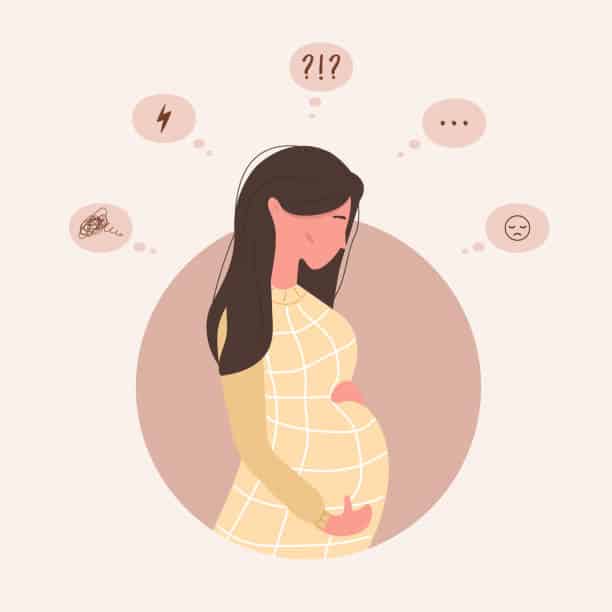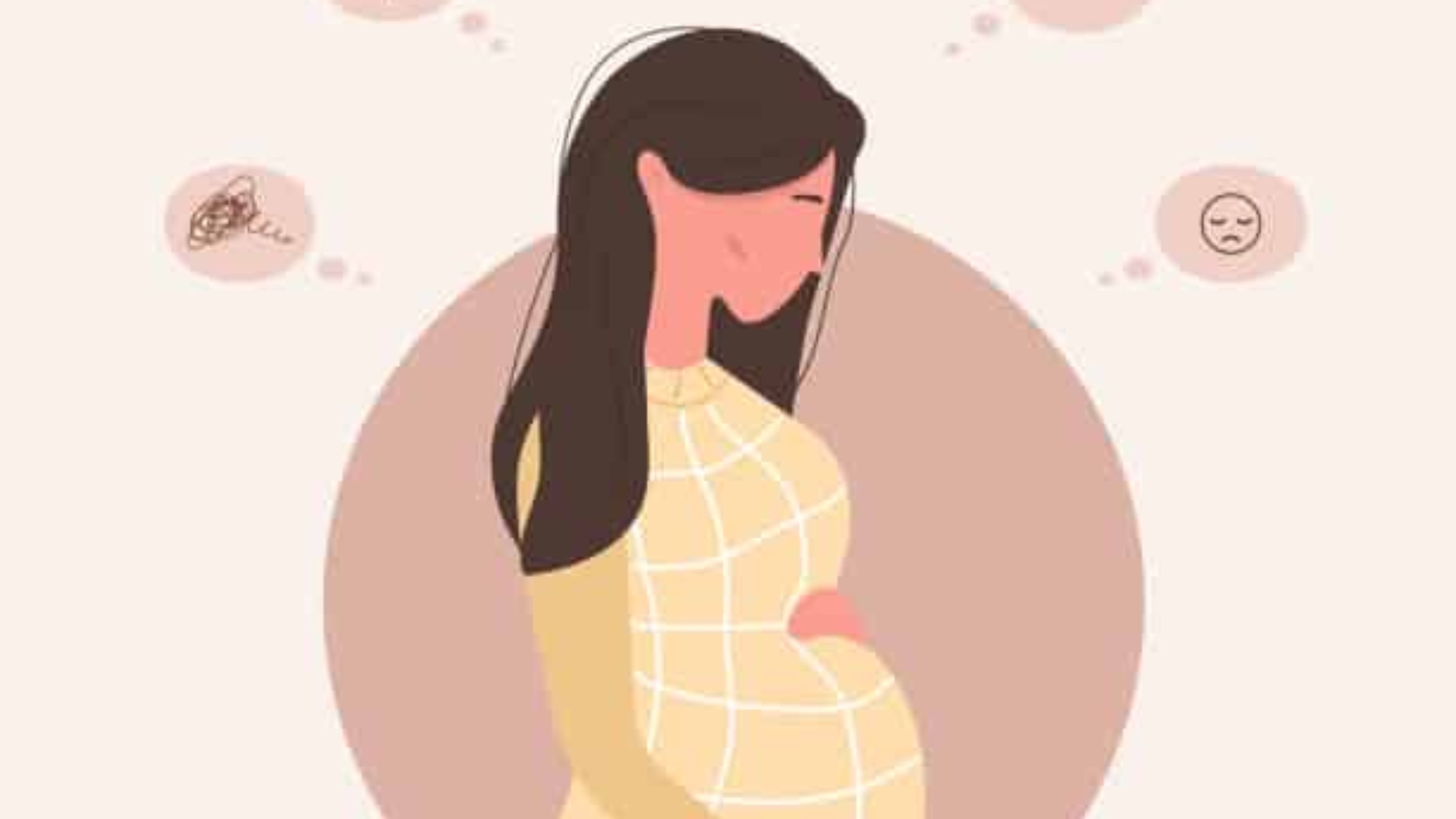
A newborn baby’s arrival is a time of great excitement and joy, as well as a tornado of feelings. But sometimes, under the surface of happy baby pictures and cooing sounds, a struggle goes unnoticed: postpartum anxiety.
Up to 80% of new mothers may experience the “baby blues” after giving birth, but postpartum anxiety is a different and more serious illness. This thorough guide clarifies postpartum anxiety, enabling you to identify the symptoms, comprehend the causes, and find the right course for recovery.
Introduction
The classic pictures of motherhood are the first sounds a newborn makes, the subtle aroma of a tiny head, and the overwhelming love that envelopes you. But, there are times when a different tale is revealed beneath this flawless exterior. A story of a silent battle known as postpartum anxiety that is whispered in anxious thoughts and inscribed in the lines of restless nights.
Postpartum anxiety is more common in new mothers than the transient “baby blues.” It affects a considerable portion of them. There’s a persistent wave of anxiety, a perpetual buzz of terror, and an unseen burden that can rob this life-changing event of its joy. Many mothers experience feelings of isolation, misinterpretation, and fear of speaking their truth as a result of the anxiety that envelops their journey into parenthood.
This investigation explores the field of postpartum anxiety, which is frequently ignored. We’ll pull back the curtain and reveal the warning signs, symptoms, and underlying causes of this complicated illness. We’ll set out on a path of comprehension, tearing down the stigma and enabling moms to identify the internal struggle.
Imagine a society where it is acceptable for moms who are experiencing postpartum anxiety to speak honestly. Imagine a society in which prompt intervention is the rule rather than the exception. This guide will serve as your navigator throughout the journey, providing information, encouraging understanding, and clearing the way for recovery. So, please, mother, inhale deeply. You’re not by yourself. Together, let’s expose the covert battle of postpartum anxiety and move into the light.
Knowing Postpartum Anxiety: More Than Just the Baby Blues
Excessive worry, intrusive thoughts, and physical symptoms that make it difficult for a mother to take care of both herself and her child are the hallmarks of postpartum anxiety. In contrast to the baby blues, which usually pass after a few days or weeks, untreated postpartum anxiety can linger for months or even longer.
Postpartum anxiety symptoms and indicators include:
- Excessive worry and anxiety: One of the main signs is ongoing concern for the development, safety, or well-being of the infant.
- Unwanted, upsetting thoughts: It can be incredibly scary and overwhelming to have intrusive thoughts about hurting yourself or your child.
- Panic attacks: Panic attacks are sudden bursts of extreme anxiety or discomfort accompanied by physical signs such as palpitations, dizziness, or shortness of breath.
- Sleep issues: Anxiety can be made worse by having trouble falling asleep, staying asleep, or waking up feeling worn out.
- Anger and irritability: Experiencing frequent bouts of frustration or overwhelm may trigger angry or impatient outbursts.
- Concentration problems: Anxiety can make it difficult to concentrate on regular tasks or provide your baby with the care they need.
- Physical symptoms: Postpartum anxiety can be linked to headaches, tense muscles, exhaustion, and changes in appetite.
Postpartum Anxiety Causes: A Complicated Mix
Although the precise causes of postpartum anxiety are not entirely understood, some factors are thought to be involved:
- Hormonal fluctuations: Mood and anxiety can be greatly affected by the abrupt decrease in progesterone and estrogen levels following childbirth.
- Sleep deprivation: Because newborns frequently have irregular sleep schedules, mothers may experience sleep deprivation, which can exacerbate symptoms of anxiety.
- Stressful life events: Having trouble breastfeeding, worrying about money, or having relationship issues can all increase stress and cause postpartum anxiety.
- Anxiety or depression history: Postpartum anxiety is more likely to strike women who have experienced anxiety or depression in the past.
- Social isolation: Anxiety symptoms may worsen if one feels abandoned or alone.
Breaking the Silence: The Importance of Asking for Help
Postpartum anxiety indeed exists, and asking for assistance is a sign of strength rather than weakness. This is why it’s so important to intervene early:
- Enhanced well-being: Receiving treatment can greatly lessen the symptoms of anxiety and enhance your general feeling of well-being.
- Improved bonding with your child: It can be difficult to form a strong bond with your child when you’re nervous. You can overcome anxiety and have a more fulfilling motherhood experience with treatment.
- Decreased chance of long-term consequences: Untreated postpartum anxiety can result in substance abuse, depression, and other long-term health issues.
- Creating a loving and caring atmosphere for your family: Your ability to do so is directly impacted by your state of health.
Options for Postpartum Anxiety Treatment
There are numerous efficient methods for treating postpartum anxiety. This is a synopsis:
- Therapy: One type of therapy that can assist you in recognizing and altering the negative thought patterns that fuel anxiety is cognitive-behavioral therapy or CBT.
- Medication: To help control anxiety symptoms, a doctor may occasionally prescribe medication.
- Support groups: Making connections with other moms going through the same thing as you can offer priceless understanding and support.
- Modifications to lifestyle: Regular exercise, a balanced diet, and adequate sleep can all help lessen the symptoms of anxiety.
Helping a Family Member Dealing with Postpartum Anxiety
Here are some ways you can help if you think a loved one is experiencing postpartum anxiety:
- Be a judgment-free listener: Provide a secure environment where your loved one can communicate their emotions.
- Provide useful assistance: A little relief from the stress and strain can come from assistance with errands, childcare, and household chores.
- Encourage professional help: Promote expert assistance by offering to assist your loved one in locating a therapist or other mental health specialist.
- Educate yourself about postpartum anxiety: Learn as much as you can about postpartum anxiety; the more you understand, the more capable you will be to help your loved one.
Creating a Better Future: Managing the Recovery Process from Postpartum Anxiety
There will be ups and downs on the journey of recovering from postpartum anxiety. Here are some more pointers to help you on your journey to recovery:
- Be patient with yourself: It takes time to heal, so be patient with yourself. If you don’t feel better right away, don’t give up.
- Practice self-care: Put your health first. Engage in self-care. Even if it’s only for a short while each day, schedule time for the things you enjoy doing.
- Be reasonable with yourself: becoming a new mother is difficult. Don’t overburden yourself with expectations of perfection.
- Celebrate little victories: No matter how tiny the change may seem, acknowledge your progress. Every step you take in the right direction is a step forward.
- Make connections with other mothers: Look for online forums or support groups where you can get in touch with other mothers who are experiencing similar things.
- Don’t be afraid to ask for help: Ask for assistance when you need it; rely on your friends, family, and partner. You don’t need to face this obstacle by yourself.
Having a Joyful Life: Overcoming Postpartum Anxiety
Although postpartum anxiety can be extremely overwhelming, it doesn’t have to define your experience as a mother. Early intervention, the support of family and friends, and a dedication to self-care will help you overcome anxiety and create a happy, fulfilling life with your child.
Beyond postpartum anxiety, life can look like this:
- Greater connection with your child: You can bond with your child more deeply and fully experience the joys of motherhood when you feel in control and empowered.
- Enhanced sense of well-being: Living without anxiety enables you to fully appreciate life and accept the lovely chaos that is parenthood.
- Empowered mothering: Overcoming anxiety makes you a stronger, more self-assured woman who can gracefully handle the demands of parenthood.
Conclusion
A better morning is ahead of you as you make your way down the healing path. With this newfound knowledge, you are better equipped to identify the symptoms of postpartum anxiety in both yourself and other people. You’ve learned about the tools at your disposal to aid in your journey and you’ve accepted your inner strength to ask for assistance.
Recall that this is not an isolated journey. Your partner, family, friends, and support networks in the village you’ve built are here to provide unwavering support. With their support and affection, you’ll overcome difficult times and rejoice in both small and large wins.
There is a world full of motherhood’s delights hidden behind the mist of worry. The moments that were previously obscured by worry the first grins, the soft coos, the indescribable love that develops between mother and child will now be brilliantly clear.
Thus, my dear mother, take this great strength you’ve found with you as you enter this brighter future. Having overcome the silent battle of postpartum anxiety, you are a warrior. Accept the journey that comes with being a mother, rejoice in the wonders that surround you, and remember that you are not alone. You leave a legacy of fortitude, hope, and unwavering love for your priceless child with every step you take forward.

Leave Your Comment